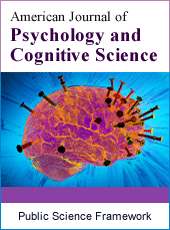American Journal of Psychology and Cognitive Science
Articles Information
American Journal of Psychology and Cognitive Science, Vol.4, No.2, Jun. 2018, Pub. Date: Jun. 14, 2018
The Relationship Between Job Motivation and Organizational Climate with Administrative Corruption Between Khorrambid Municipal Employees
Pages: 17-21 Views: 2380 Downloads: 520
[01]
Mahsa Khosravani, Department of Psychology, Arsanjan Branch, Islamic Azad University, Arsanjan, Iran.
[02]
Seyed Ahmad Mirjafari, Department of Psychology, Arsanjan Branch, Islamic Azad University, Arsanjan, Iran.
The purpose of this study was to investigate the relationship between job motivation and organizational climate with administrative corruption among employees of Khorrambid Municipality. The statistical population consisted of all employees of Khorrambid municipality; their number was 130 in this year. The random sample of 97 people was selected as a statistical sample. Corruption inventory questionnaire, job motivation questionnaire and organizational climate questionnaire were used to collect data. Validity of the questionnaires was verified using content validity and reliability through Cronbach's alpha. Descriptive statistics (mean) and inferential statistics (Pearson correlation and multiple regression tests) were used to analyze the data. The results showed that there is a significant negative relationship between organizational climate and dimensions of job motivation with corruption. The results of regression analysis showed that among dimensions of organizational climate, dimensions of disturbance, intimacy, interest, consideration, distance, influence and dynamics, and among dimensions of job motivation, salary dimensions, environment, job security, how Supervision and supervision, recognition and appreciation, career advancement and job development, job responsibilities, and job positions are a significant negative predictor of administrative corruption.
Administrative Corruption, Organizational Climate, Job Motivation, Staff
[01]
Alvani, Mahdi; Jafareh, Manouchehr (1996). A Theoretical Model for Control and Control of Corruption, Journal of Economics and Management, No. 36.
[02]
Beygzade Abbasi, Farzaneh and Nasrin Amiri Khanmakani, 2014, Organizational and Managerial Factors Affecting Administrative Corruption - Financial in Government Organizations, National Conference on Management Sciences, Tehran, BoAli Research Group.
[03]
Bagherzadeh Khorasgani, Majid and Mehdi Kalantari, 2015, The Effect of Intra-Organizational Factors on Corruption in Banks in terms of Employees of the Bank of Welfare of Workers of Isfahan Province, The 2nd International Conference on Innovation, Development and Business in History, Tehran, Kian Pajohan Scientific Institute.
[04]
Blackburn, K., Gonzalo, F., & Forgues, P. (2010). Financial liberalization, bureaucratic corruption and economic development. Journal of International Money and Finance, 29.
[05]
Dadgar, Hasan, Corruption in Iran's Contemporary History, 2002, www.bashgah.net.
[06]
Fallah, Mohammad Reza; Amir Hamzeh Mehrabi and Mehdi Mehrabi, 2014, Investigating the relationship between organizational factors and the probability of corruption in the banking system from the viewpoint of Ansar Bank employees, International Management Conference, Economics and Industrial Engineering, Tehran, Institute of Managers of Vida Capital.
[07]
Kalanipour, Fathollah; Saeed Saeedaradarkani and Hamed Keshavarz, 2014; Investigating the causes, indications and effects of corruption and providing solutions to deal with it; Management Conference, Transformation and Innovation in Management Empowerment, Shiraz, Pandar Andish Rahpo Co.
[08]
Ksenia (2008). Can Corruption and Economic Crime Be Controlled in Developing Countries and if so, is it Cost-effective. Journal of Financial crime, 15 (2), 223-233.
[09]
Ramezani Nejad, Rahim, Pour Soltani Zarandi, Hossein Hosseini Nia, Seyyed Reza (2008), The Relationship between School Organization and Burnout in Teachers of Physical Education, Sport Management, 1, 225-235.
[10]
Seldadyo, H. Haan, J. (2006) "The Determinants of Corruption: A Literature Survey and New Evidence", Paper Prepared for the 2006 EPCS Conference, Turku, Finland, 20-23, April.
[11]
Soleimani, Hadi, Abbas Soleimani and Reza Nahidi, 2013, Investigating the Relationship Between Some Internal and External Organizations with Corruption (Case Study: Tax Administration, Documentation and Municipal Office of Damghan, International Management Conference, Tehran, Mobin Institute of Cultural Ambassadors.
[12]
Zahedi, Shams al-Sadat; Mohammad Nabi, S.; Shahbazi, M. (2008). Investigating the Factors Affecting Corruption Reduction (Case Study in Tehran Municipality). Management of Organizational Culture, seventh year, number twenty, pages 29-55.

ISSN Print: 2381-7453
ISSN Online: 2381-747X
Current Issue:
Vol. 6, Issue 2, June Submit a Manuscript Join Editorial Board Join Reviewer Team
ISSN Online: 2381-747X
Current Issue:
Vol. 6, Issue 2, June Submit a Manuscript Join Editorial Board Join Reviewer Team
| About This Journal |
| All Issues |
| Open Access |
| Indexing |
| Payment Information |
| Author Guidelines |
| Review Process |
| Publication Ethics |
| Editorial Board |
| Peer Reviewers |


